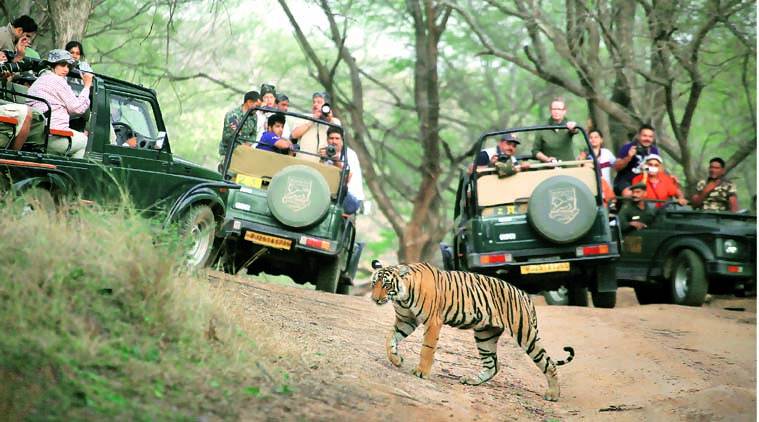 The highways cut through the tiger reserve, which is home to over 100 tigers and 1,800 elephants. (Photo for representation purpose)
The highways cut through the tiger reserve, which is home to over 100 tigers and 1,800 elephants. (Photo for representation purpose)
If the Ministry of Road Transport and Highways has its way, the nine-year-long ban on night traffic through NH-212 that cuts through the Bandipur tiger reserve in Karnataka may end soon.
In a letter to the Karnataka Chief Secretary on July 21, two days before the matter was due in the Supreme Court, MoRTH secretary Y S Malik wrote that he “requested for a short adjournment of 15 days” and asked the state to send its consent “immediately” for widening and opening the road with no restrictions but with mitigation measures such as animal passageways.
The next hearing is on August 8.
Following the road kills of 215 mammals, birds and snakes between 2004 and 2007 in Bandipur, the Karnataka High Court in 2009 banned night traffic on two national highways — NH-67 and NH-212, linking Karnataka with Tamil Nadu and Kerala respectively. The highways cut through the tiger reserve, which is home to over 100 tigers and 1,800 elephants. An alternate road, longer by 30 km, was developed to divert the NH-212 traffic.
While Tamil Nadu never contested the decision and went ahead to impose a similar ban on night traffic through its Mudumalai tiger reserve, Kerala has been pushing for removing the restriction on NH-212 for economic reasons.
In January this year, the Supreme Court set up a committee under the secretary, MoRTH, with a representative each from the state governments of Kerala, Karnataka, Tamil Nadu and the National Tiger Conservation Authority (NTCA) to look into the issue and submit a report within three months.
After conducting site visits and consulting the stakeholders, the NTCA in March recommended maintaining status quo, adding that roads proposed under the Bharatmala project will connect Bangalore to different places in Kerala without affecting protected forests.
In April 2018, Karnataka also wrote to the MoRTH that the state’s stand was to “continue with the existing restrictions” and that Tamil Nadu had also accepted the present arrangement.
But in his July 21 letter, the MoRTH secretary wrote: “Since. Karnataka had its reservations on removing the night restrictions on plying of traffic, I had almost finalised my report for filing before the Hon’ble Supreme Court.”
However, he went on to write, that the issue came up at a meeting between the chief minister and the PWD minister of Karnataka and the MoRTH minister on July 17, where the former agreed with the recommendations of the ministry to open the NH 212 on a 24×7 basis and widening it with adequate mitigation measures.
“Request you to kindly send the consent of the Government of Karnataka with the proposed scheme immediately so that the report of the committee is finalised,” his letter said.
While officials in Bangalore declined comment, sources claimed that the Chief Minister’s Office was considering legal opinions against changing the state’s stated position before the court. When contacted, Malik said: “The SC-appointed committee cannot make public the ongoing consultation process. Once the report is submitted, the court will decide.”
The draft recommendation attached to the letter suggests status quo on NH-67 as both Karnataka and Tamil Nadu are satisfied. On NH-212, arguing that the alternative hilly road takes longer and adds to fuel consumption, the draft recommends widening the existing right of way width of 10-15 metres to a uniform 15 meters, creating five elevated stretches of 1-km each and installing steel-wired 8-feet high fencing on both sides of the road. It proposes that the ministry and the Kerala government equally share the tentative cost burden of Rs 46,000 crore.
“Bandipur, with the adjacent Nagarhole, Mudumalai and Wayanad, is India’s crown jewel. The proposed mitigation of a few wildlife passages won’t serve the territorial animals. If a cat is cut off from one half of its territory by the road, will another cat let it pass through the latter’s territory and cross over? Such extensive construction work will anyway be disruptive. For a lasting solution, we should invest in a road north of Nagarhole outside dense forests,” said ecologist Ajay Desai, who is also member, Karnataka state wildlife board.